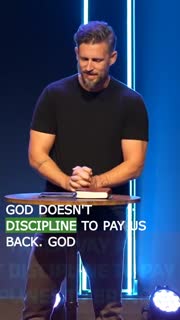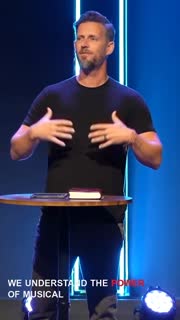Lessons of Faithfulness and Consequences from 2 Kings
Devotional
Sermon Summary
Bible Study Guide
Sermon Clips
1. "One is because it's very true that you are as close to God as you want to be. I don't know if you realize. But if it ever feels like God is nowhere to be found, he is usually not the one who moved. It's usually us. And so when we open up the pages of this book and we begin to read and study the pages of this book, there's something unique that happens where as we study this book, this book studies us. And it becomes the words of life that move in our life and that move in our soul. And they shape us into the person God's created us to be." [03:39] (30 seconds)
2. "When you get in God's word, God's word gets in you. And it just begins to, again, give you the strength and give you the power to operate in what God has created and called you to do." [04:26] (9 seconds)
3. "When we offer God what we have, then we can trust him to give us what we need. When you offer God what you have, you can trust him to give you what you need. I want to rewind. I want to rewind to the story of Elisha. When Elisha was called by God, when he was given this charge to go make an impact in the world for God, he had nothing to offer. In fact, I think Pastor Brandon talked about it last week in the first couple chapters of 2 Kings. When he was called to work for God, he was actually working in a field." [31:03] (24 seconds)
4. "Regarding our sin, what initially attracts us will eventually attack us. What initially draws us will eventually come against us. The sins of the northern kingdom and the southern kingdom, they were not that much different. They were honestly pretty much the same. They were constantly opting for a culture and laws and gods of the surrounding nations. And every time they would do this, those gods and those other nations would turn on them and would end up just ripping them to shreds and robbing them." [33:52] (27 seconds)
5. "God doesn't discipline to pay us back. God disciplines to bring us back. You read through the story of 2 Kings, and time after time, God showed his grace trying to get his people's attention. And the reason that he did that is because even when they would turn their back on him, even when they ran away from him, even when they thought they knew better than him, God knew that they belonged to him and that he had a plan for them. He never relinquished, he never relented on that. He never turned his head from that. He went to great lengths to reach them." [35:45] (32 seconds)
6. "When God looks at you, regardless of the decisions you've made, regardless of their current situation, regardless of where you're at right now, when God looks at you, he looks at you and sees someone who belongs to him. He looks at you and sees someone that he says, I have a plan for them. And time after time, and this morning is one of those times, he is doing everything that he can. And he is going to great lengths to get your attention as well. Because God wants you back. You may feel like you're in a season of being disciplined by God. Can I just tell you that God does not discipline you to get even. He disciplines you to get you." [36:45] (37 seconds)
7. "The grace of Jesus is present for you. That while the end of a book in the Old Testament may end in destruction, it may end with all of your sins on display. That when we trust God, the scripture says that when we confess our sins to him and we confess them to other people, that he will save us and that our confession will set us free. That all of a sudden, our old ways can be transformed into new. That all of a sudden, the things that once held us in a king's prison can now be turned into a platform to reach people in Jesus' name." [35:09] (30 seconds)
8. "We understand the power of musical worship. We understand that musical worship oftentimes precedes the power of God moving in our lives. In fact, the scripture describes it this way. It says that God inhabits the praises of his people. So when you sing, sometimes it's not just you saying, God, I'm doing this because I love this song, or I love the beat, or I love the words, but it's you saying, God, I need your presence in my life." [12:57] (23 seconds)
9. "You are as close to God as you want to be. I don't know if you realize. But if it ever feels like God is nowhere to be found, he is usually not the one who moved. It's usually us. And so when we open up the pages of this book and we begin to read and study the pages of this book, there's something unique that happens where as we study this book, this book studies us. And it becomes the words of life that move in our life and that move in our soul. And they shape us into the person God's created us to be." [03:39] (27 seconds)
10. "When we trust God, the scripture says that when we confess our sins to him and we confess them to other people, that he will save us and that our confession will set us free. That all of a sudden, our old ways can be transformed into new. That all of a sudden, the things that once held us in a king's prison can now be turned into a platform to reach people in Jesus' name. And all it does is it starts with you just saying, Jesus, I'm just surrendering this to you. And he'll replace pain with peace. He'll replace sin with salvation. He has a way of turning around the things that just look like they're leading to our destruction." [35:09] (35 seconds)
Ask a question about this sermon
2. "When you get in God's word, God's word gets in you. And it just begins to, again, give you the strength and give you the power to operate in what God has created and called you to do." [04:26] (9 seconds)
3. "When we offer God what we have, then we can trust him to give us what we need. When you offer God what you have, you can trust him to give you what you need. I want to rewind. I want to rewind to the story of Elisha. When Elisha was called by God, when he was given this charge to go make an impact in the world for God, he had nothing to offer. In fact, I think Pastor Brandon talked about it last week in the first couple chapters of 2 Kings. When he was called to work for God, he was actually working in a field." [31:03] (24 seconds)
4. "Regarding our sin, what initially attracts us will eventually attack us. What initially draws us will eventually come against us. The sins of the northern kingdom and the southern kingdom, they were not that much different. They were honestly pretty much the same. They were constantly opting for a culture and laws and gods of the surrounding nations. And every time they would do this, those gods and those other nations would turn on them and would end up just ripping them to shreds and robbing them." [33:52] (27 seconds)
5. "God doesn't discipline to pay us back. God disciplines to bring us back. You read through the story of 2 Kings, and time after time, God showed his grace trying to get his people's attention. And the reason that he did that is because even when they would turn their back on him, even when they ran away from him, even when they thought they knew better than him, God knew that they belonged to him and that he had a plan for them. He never relinquished, he never relented on that. He never turned his head from that. He went to great lengths to reach them." [35:45] (32 seconds)
6. "When God looks at you, regardless of the decisions you've made, regardless of their current situation, regardless of where you're at right now, when God looks at you, he looks at you and sees someone who belongs to him. He looks at you and sees someone that he says, I have a plan for them. And time after time, and this morning is one of those times, he is doing everything that he can. And he is going to great lengths to get your attention as well. Because God wants you back. You may feel like you're in a season of being disciplined by God. Can I just tell you that God does not discipline you to get even. He disciplines you to get you." [36:45] (37 seconds)
7. "The grace of Jesus is present for you. That while the end of a book in the Old Testament may end in destruction, it may end with all of your sins on display. That when we trust God, the scripture says that when we confess our sins to him and we confess them to other people, that he will save us and that our confession will set us free. That all of a sudden, our old ways can be transformed into new. That all of a sudden, the things that once held us in a king's prison can now be turned into a platform to reach people in Jesus' name." [35:09] (30 seconds)
8. "We understand the power of musical worship. We understand that musical worship oftentimes precedes the power of God moving in our lives. In fact, the scripture describes it this way. It says that God inhabits the praises of his people. So when you sing, sometimes it's not just you saying, God, I'm doing this because I love this song, or I love the beat, or I love the words, but it's you saying, God, I need your presence in my life." [12:57] (23 seconds)
9. "You are as close to God as you want to be. I don't know if you realize. But if it ever feels like God is nowhere to be found, he is usually not the one who moved. It's usually us. And so when we open up the pages of this book and we begin to read and study the pages of this book, there's something unique that happens where as we study this book, this book studies us. And it becomes the words of life that move in our life and that move in our soul. And they shape us into the person God's created us to be." [03:39] (27 seconds)
10. "When we trust God, the scripture says that when we confess our sins to him and we confess them to other people, that he will save us and that our confession will set us free. That all of a sudden, our old ways can be transformed into new. That all of a sudden, the things that once held us in a king's prison can now be turned into a platform to reach people in Jesus' name. And all it does is it starts with you just saying, Jesus, I'm just surrendering this to you. And he'll replace pain with peace. He'll replace sin with salvation. He has a way of turning around the things that just look like they're leading to our destruction." [35:09] (35 seconds)










